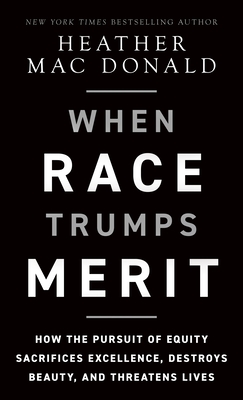When Race Trumps Merit: How the Pursuit of Equity Sacrifices Excellence, Destroys Beauty, and Threatens Lives

When Race Trumps Merit: How the Pursuit of Equity Sacrifices Excellence, Destroys Beauty, and Threatens Lives
Does your workplace have too few black people in top jobs? It's racist. Does the advanced math and science high school in your city have too many Asians? It's racist. Does your local museum employ too many white women? It's racist, too.After the Black Lives Matter protests of 2020, prestigious American institutions, from the medical profession to the fine arts, pleaded guilty to "systemic racism." How else explain why blacks are overrepresented in prisons and underrepresented in C-suites and faculty lounges, their leaders asked?The official answer for those disparities is "disparate impact," a once obscure legal theory that is now transforming our world. Any traditional standard of behavior or achievement that impedes exact racial proportionality in any enterprise is now presumed racist. Medical school admissions tests, expectations of scientific accomplishment in the award of research grants, the enforcement of the criminal law--all are under assault, because they have a "disparate impact" on underrepresented minorities.When Race Trumps Merit provides an alternative explanation for those racial disparities. It is large academic skills gaps that cause the lack of proportional representation in our most meritocratic organizations and large differences in criminal offending that account for the racially disproportionate prison population.The need for such a corrective argument could not be more urgent. Federal science agencies now treat researchers' skin color as a scientific qualification. Museums and orchestras choose which art and music to promote based on race. Police officers avoid making arrests and prosecutors decline to bring charges to avoid disparate impact on minority criminals.When Race Trumps Merit breaks powerful taboos. But it is driven by a sense of alarm, supported by detailed case studies of how disparate-impact thinking is jeopardizing scientific progress, destroying public order, and poisoning the appreciation of art and culture. As long as alleged racism remains the only allowable explanation for racial differences, we will continue tearing down excellence and putting lives, as well as civilizational achievement, at risk.
154.63Lei
154.63Lei
Indisponibil
Descrierea produsului
Does your workplace have too few black people in top jobs? It's racist. Does the advanced math and science high school in your city have too many Asians? It's racist. Does your local museum employ too many white women? It's racist, too.After the Black Lives Matter protests of 2020, prestigious American institutions, from the medical profession to the fine arts, pleaded guilty to "systemic racism." How else explain why blacks are overrepresented in prisons and underrepresented in C-suites and faculty lounges, their leaders asked?The official answer for those disparities is "disparate impact," a once obscure legal theory that is now transforming our world. Any traditional standard of behavior or achievement that impedes exact racial proportionality in any enterprise is now presumed racist. Medical school admissions tests, expectations of scientific accomplishment in the award of research grants, the enforcement of the criminal law--all are under assault, because they have a "disparate impact" on underrepresented minorities.When Race Trumps Merit provides an alternative explanation for those racial disparities. It is large academic skills gaps that cause the lack of proportional representation in our most meritocratic organizations and large differences in criminal offending that account for the racially disproportionate prison population.The need for such a corrective argument could not be more urgent. Federal science agencies now treat researchers' skin color as a scientific qualification. Museums and orchestras choose which art and music to promote based on race. Police officers avoid making arrests and prosecutors decline to bring charges to avoid disparate impact on minority criminals.When Race Trumps Merit breaks powerful taboos. But it is driven by a sense of alarm, supported by detailed case studies of how disparate-impact thinking is jeopardizing scientific progress, destroying public order, and poisoning the appreciation of art and culture. As long as alleged racism remains the only allowable explanation for racial differences, we will continue tearing down excellence and putting lives, as well as civilizational achievement, at risk.
Detaliile produsului










